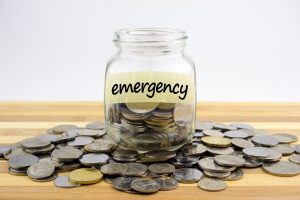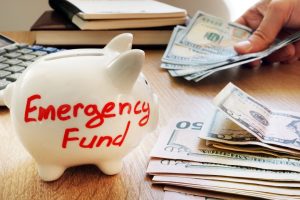Having an emergency fund is an important part of personal financial planning because it provides individuals and families with a safety net that allows them to deal with unexpected expenses without jeopardizing their long-term financial goals. This complete guide discusses emergency savings, why they’re important, how to start and maintain them, and how to use them wisely.
Understanding Emergency Savings
Emergency savings, also called an emergency fund, is intended to serve as a financial cushion in case an unexpected event puts a strain on your finances, such as medical bills, job loss, or the need for immediate repairs around the home. Regular savings are used for planned expenses, such as a vacation or buying a house. Emergency savings, on the other hand, are only for things that can’t be planned for. Having this money will help you avoid getting into debt or having trouble paying your bills when unexpected expenses arise.
How Much Should You Save?
Many financial experts say you should have enough money in your emergency fund to cover three to six months of living expenses. But the exact amount you need to save should depend on your job security, monthly bills, and the number of people who rely on your income. For example, an employee whose income changes frequently may need a larger emergency fund than an employee with a stable job and a fixed monthly income.
The Significance of Emergency Savings
An emergency fund is important for your financial security and is more than just a safety net. It allows you to deal with unexpected costs without having to go into debt, which can prevent you from falling into a vicious cycle of financial stress and uncertainty.
Saving money for certain situations can make you feel a lot less stressed and give you peace of mind. Having this extra money can give you peace of mind knowing that you are prepared for any financial crisis.
Make plans for emergencies
When creating an emergency savings plan, you should first look at your current financial situation. Take a look at your salary, your expenses, your debts, and any other financial obligations you have. Knowing how much money you have can help you figure out how much money you can save each month as an emergency fund.
Once you know how much money you have, you can set reasonable savings goals. You need to figure out how much money your emergency fund needs and set a date by which you want to reach that goal. Breaking it down into smaller, more achievable monthly or weekly goals may help you achieve your bigger goal of saving more.
Set up automatic savings
Automating your savings is a great way to ensure you always have money for a rainy day. Set up your savings account to automatically receive money from your bank account every time you receive a payment. This ‘set it and forget it’ approach makes saving easy and keeps you from wanting to spend your money on other things.
Can’t save money for emergencies
Setting up an emergency fund can be scary, especially if you’re dealing with issues like low income, high expenses, or debt. To combat these problems, prioritize spending, cut unnecessary costs, and consider taking on extra jobs or side hustles to earn extra money. It’s also important to be smart with your debt, as high-interest loans can make saving more difficult.
Maintain savings discipline
Building a strong emergency fund takes discipline and perseverance. Remember the peace of mind that comes with having a safety net, and keep your financial goals in mind to stay inspired. Review and change your savings plan regularly to ensure it suits your financial situation and goals. This will help you make steady progress toward your emergency savings fund.
Use your emergency fund
Success stories from real people can give you ideas and show you the importance of saving money for emergencies. Take, for example, the story of a family whose emergency fund saved them from bankruptcy when someone suddenly lost their job. These stories show the importance of being prepared and how emergency savings can help you stay financially stable.
To stay financially prepared, track your expenses, regularly review and change your emergency fund goals, and learn new ways to plan your money. Find out what you can do with your money and talk to a financial expert to ensure your saving and spending methods are effective and sustainable.
Conclusion
Having emergency savings is important for good financial health because it protects you from unexpected life events and keeps you financially stable during difficult times. By prioritizing building and maintaining these funds, people can protect their future, reduce stress, and feel confident as they face the unknown. As the economy changes, people may place more emphasis on saving for emergencies. This makes planning and saving regularly even more important. Saving money for a rainy day isn’t just about safety; It is also a matter of gaining inner peace and strength to deal with the unexpected things that happen in life.
FAQs
1. Under what circumstances should you use these funds?
For these funds, an emergency is a sudden, necessary expense that you cannot cover with your normal income or savings. In these situations, late payments can have very bad consequences, such as a medical emergency, the need for immediate home repairs, or a sudden job loss.
2. What is the fastest way to build a reserve fund?
To grow your emergency fund faster, get extra money from a side hustle or a freelance job, cut back on spending on things you don’t need, and transfer any extra money you earn, like tax returns or bonuses, into your savings. Review your budget regularly and make changes to it so you can find more ways to save money.
3. If I want a better return on my emergency money, should I invest it?
It’s best to keep your emergency savings safe and easily accessible, so it’s not a good idea to invest it in markets that can rise and fall. Keep them in a high-yield savings or money market account so the money is safe and easily accessible.
4. How do you save for emergencies while achieving other financial goals?
To save for emergencies while achieving other financial goals, you need to decide which needs are more important. Start saving some money for emergencies. Then pay off your high-interest debt. Finally, build your emergency savings slowly while saving for long-term goals like retirement.
5. What is the best way to track my reserve funds?
Best practices include keeping your money in separate accounts that are easily accessible, making regular deposits, paying close attention to the amount to make sure it meets your needs, and not using the money for inappropriate purposes. Emergencies. Review your emergency fund regularly and make changes as necessary based on your current financial situation.
6. How often should I review and change my emergency savings plan?
You should review and change your emergency savings plan at least once a year, or whenever significant changes occur in your financial situation (such as when your income, expenses, or family circumstances change). This helps you tailor your emergency fund to your current financial goals and needs.


